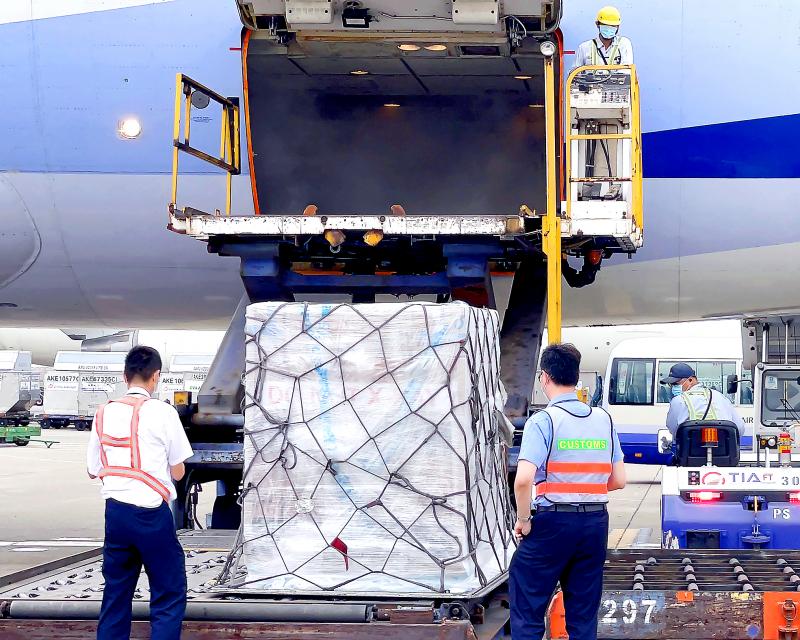The government yesterday welcomed the arrival of 150,000 doses of the Moderna COVID-19 vaccine, the first batch of its order from the US pharmaceutical firm.
The batch, carried by a China Airlines Ltd (中華航空) cargo flight of Taiwan’s national carrier, arrived at Taiwan Taoyuan International Airport at about 5pm, slightly later than the Central Epidemic Command Center’s (CECC) 3:50pm estimate given on Thursday night.
The flight departed from Luxembourg yesterday morning and stopped at Dubai before reaching Taiwan.

Photo: Chu Pei-hsiung, Taipei Times
Prior to its arrival, many aviation enthusiasts on Facebook had posted images of flight trackers showing the plane crossing the airspace above India and Vietnam, avoiding China and Hong Kong, before finally landing in Taiwan.
“The American Institute in Taiwan [AIT] welcomes the arrival of the first batch of Moderna COVID-19 vaccines, the first American vaccine to arrive in Taiwan,” the AIT wrote on Facebook yesterday morning before its arrival, adding: “We continue to communicate with Taiwan at all levels on this urgent issue.”
The US’ de facto embassy has been criticized for not assisting Taiwan with vaccine acquisition, since outgoing AIT Director Brent Christensen on Wednesday said that Washington had yet to finalize its standards for distributing its stockpile of vaccines, adding that Taiwan’s infection numbers were among the lowest in the world.
Meanwhile, a Japanese ruling party committee on Taiwan relations yesterday said it would recommend that the government supply a portion of Japan’s AstraZeneca vaccine stock to Taiwan to help it tackle a surge in infections.
“We should provide Taiwan with vaccines as soon as possible,” the head of the Liberal Democratic Party’s policy group, Masahisa Sato, told a news briefing following the meeting.
The recommendation is to be included in a set of proposals the policy group would give to Japanese Minister of Foreign Affairs Toshimitsu Motegi.
“Taiwan has many friends in Japan doing their best to help Taiwan in various ways. If there is any good news, we will announce it after it is confirmed,” Presidential Office spokesman Xavier Chang (張惇涵) said.
The Ministry of Foreign Affairs added that Taipei was seeking “like-minded countries to help obtain vaccines, and efforts have not ceased.”
In other news, in response to local government officials asking the central government to allow them to purchase vaccines independently through their own channels, the CECC yesterday released a set of requirements for applying to do so.
Local governments or businesses that intend to apply to import COVID-19 vaccines can ask pharmaceutical firms to submit vaccine rollout plans, instructions, storage and cooling logistics plans, manufacturing authorizations and documents that confirm a vaccine’s commercialization in other countries, the CECC said.
The applications would be reviewed by experts convened by the Food and Drug Administration, while use of the vaccines must abide by the CECC’s regulations, it added.
Additional reporting by Reuters

RESPONSE: The transit sends a message that China’s alignment with other countries would not deter the West from defending freedom of navigation, an academic said Canadian frigate the Ville de Quebec and Australian guided-missile destroyer the Brisbane transited the Taiwan Strait yesterday morning, the first time the two nations have conducted a joint freedom of navigation operation. The Canadian and Australian militaries did not immediately respond to requests for comment. The Ministry of National Defense declined to confirm the passage, saying only that Taiwan’s armed forces had deployed surveillance and reconnaissance assets, along with warships and combat aircraft, to safeguard security across the Strait. The two vessels were observed transiting northward along the eastern side of the Taiwan Strait’s median line, with Japan being their most likely destination,

‘NOT ALONE’: A Taiwan Strait war would disrupt global trade routes, and could spark a worldwide crisis, so a powerful US presence is needed as a deterrence, a US senator said US Senator Deb Fischer on Thursday urged her colleagues in the US Congress to deepen Washington’s cooperation with Taiwan and other Indo-Pacific partners to contain the global security threat from China. Fischer and other lawmakers recently returned from an official trip to the Indo-Pacific region, where they toured US military bases in Hawaii and Guam, and visited leaders, including President William Lai (賴清德). The trip underscored the reality that the world is undergoing turmoil, and maintaining a free and open Indo-Pacific region is crucial to the security interests of the US and its partners, she said. Her visit to Taiwan demonstrated ways the

GLOBAL ISSUE: If China annexes Taiwan, ‘it will not stop its expansion there, as it only becomes stronger and has more force to expand further,’ the president said China’s military and diplomatic expansion is not a sole issue for Taiwan, but one that risks world peace, President William Lai (賴清德) said yesterday, adding that Taiwan would stand with the alliance of democratic countries to preserve peace through deterrence. Lai made the remark in an exclusive interview with the Chinese-language Liberty Times (sister paper of the Taipei Times). “China is strategically pushing forward to change the international order,” Lai said, adding that China established the Asia Infrastructure Investment Bank, launched the Belt and Road Initiative, and pushed for yuan internationalization, because it wants to replace the democratic rules-based international

RELEASED: Ko emerged from a courthouse before about 700 supporters, describing his year in custody as a period of ‘suffering’ and vowed to ‘not surrender’ Former Taiwan People’s Party (TPP) chairman Ko Wen-je (柯文哲) was released on NT$70 million (US$2.29 million) bail yesterday, bringing an end to his year-long incommunicado detention as he awaits trial on corruption charges. Under the conditions set by the Taipei District Court on Friday, Ko must remain at a registered address, wear a GPS-enabled ankle monitor and is prohibited from leaving the country. He is also barred from contacting codefendants or witnesses. After Ko’s wife, Peggy Chen (陳佩琪), posted bail, Ko was transported from the Taipei Detention Center to the Taipei District Court at 12:20pm, where he was fitted with the tracking